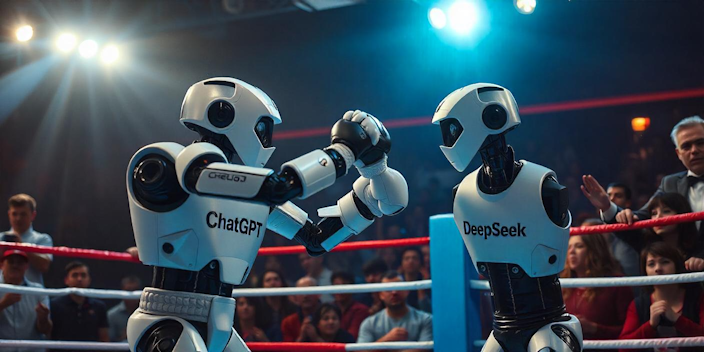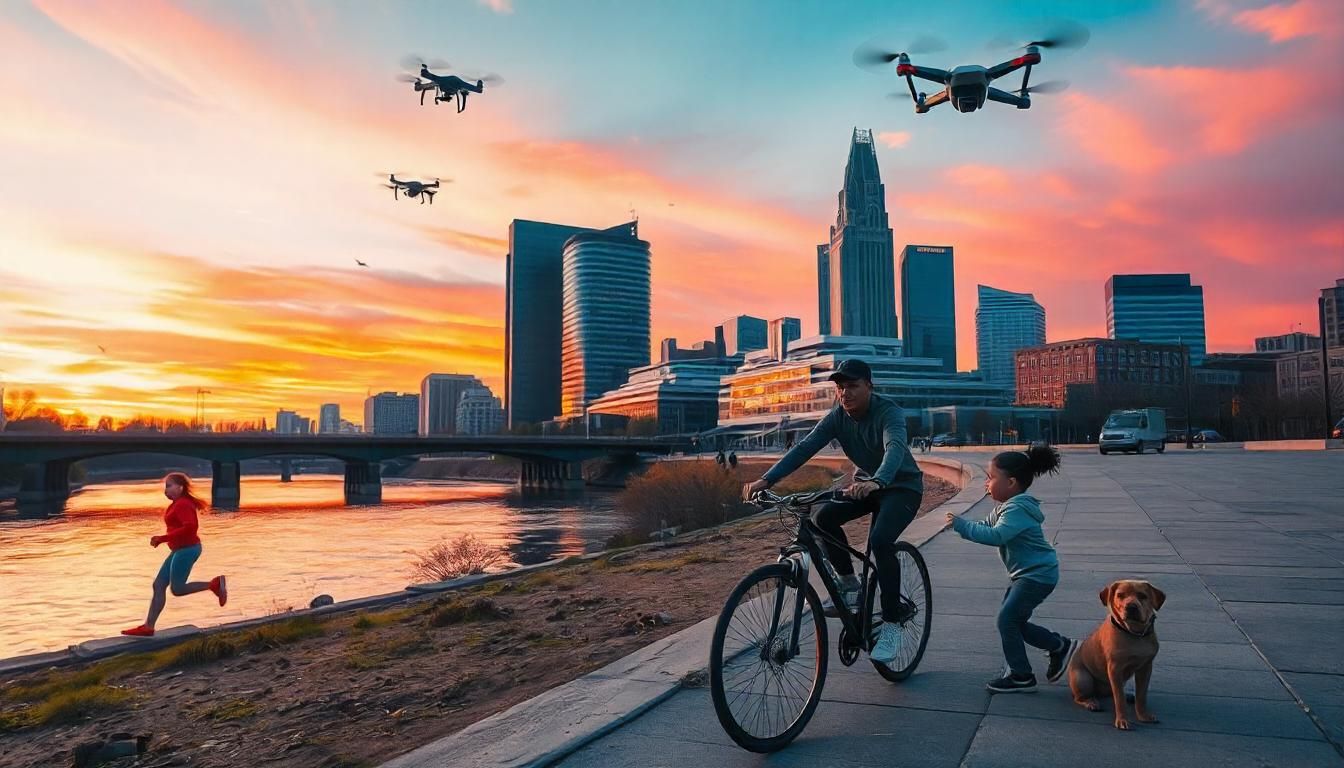
DeepSeek vs. ChatGPT: What You Need to Know Today
DeepSeek is a Chinese AI chatbot that's been turning heads since its debut on January 15, 2025. In just a short time, it's climbed to the top of app store charts, boasting over 2 million downloads. What's catching everyone's attention? Well, DeepSeek's R1 model is not only powerful but also efficient, having been trained using less advanced chips, which is quite the engineering feat. (wired.com)
ChatGPT: The Established Player
On the flip side, we have ChatGPT by OpenAI, which has been a staple in the AI chatbot arena. Known for its versatility, ChatGPT excels in text-based conversations, coding assistance, and reasoning tasks. It's been the go-to for many seeking a reliable AI companion. But its strengths go far beyond casual conversations. ChatGPT can analyze large datasets, assist in creative writing, generate marketing copy, provide programming support, and even simulate conversations for customer service training. Its ability to understand context and respond in a way that mimics human conversation has made it a powerful tool for businesses and individuals alike. With its multimodal capabilities, it can also process images and provide detailed insights, making it an even more well-rounded AI assistant.
A Personal Experiment: Putting Them to the Test
Curiosity got the better of me, so I decided to pit DeepSeek and ChatGPT against each other. I asked both to help me build a gaming PC with a $1,000 budget. DeepSeek suggested a setup with an AMD Ryzen 5 7600 and a Radeon RX 7700 XT GPU, while ChatGPT recommended a Ryzen 5 5600 paired with a Radeon RX 7600 XT.
Interestingly, when I asked ChatGPT to compare both builds, it leaned towards DeepSeek's configuration for its performance longevity. However, upon closer inspection, I noticed that DeepSeek's build required a 700W power supply, but it had only recommended a 600W one. A small oversight, but it highlights the importance of double-checking AI suggestions. (pcgamer.com)
How Accurate is DeepSeek Compared to ChatGPT?
Accuracy is a critical factor when comparing AI models, and while DeepSeek has shown promise, it isn't without flaws. While its ability to generate responses and handle logical reasoning is improving, it's still behind ChatGPT in terms of nuanced understanding, fact verification, and error reduction. The minor mistake in the PC build recommendation is just one example, but other tests have shown DeepSeek struggling with complex logical reasoning and highly specialized knowledge. ChatGPT, in contrast, has a more refined ability to analyze information critically and provide well-rounded responses, thanks to its extensive training data and iterative improvements.
Why is This Scary to the Tech Sector?
DeepSeek's rapid ascent is making waves in the tech industry, not just because of its capabilities, but due to concerns about competition, data security, and geopolitical influence. A highly capable AI model backed by China raises questions about intellectual property, AI ethics, and who ultimately controls the next generation of AI tools. If DeepSeek continues to improve and gain traction, it could challenge Western AI dominance, pushing companies like OpenAI, Google, and Microsoft to innovate even faster or risk losing their lead.
There's also the issue of misinformation. If DeepSeek becomes widely used but is less accurate or more prone to censorship, it could distort public discourse in ways we haven't fully grasped yet. The fact that it avoids politically sensitive topics also raises concerns about bias and selective information filtering.
Data Privacy: A Cause for Pause?
Now, here's where things get a bit murky. DeepSeek stores user data on servers located in China. This has raised eyebrows, especially considering that Chinese companies are subject to laws that require them to share data with the government upon request. In contrast, ChatGPT stores data on servers in the U.S., which operates under different regulatory frameworks. It's a reminder to always be mindful of where our data goes and who might have access to it. (nypost.com)
Censorship and Content Sensitivity
Another point of divergence is how these platforms handle sensitive topics. DeepSeek tends to avoid or provide limited responses on subjects that are politically sensitive in China, such as the Tiananmen Square events or discussions about Taiwan's independence. ChatGPT, on the other hand, offers more detailed and balanced responses on these topics. It's an interesting reflection of the environments in which these AIs were developed. (thetimes.co.uk)
Should People Be Concerned?
It depends on how you use AI and where your data goes. For casual users looking for a new chatbot to experiment with, DeepSeek is an interesting alternative. But if privacy and information accuracy are priorities, it's worth considering the potential risks. Data storage in China means different privacy laws apply, and users should be aware of the implications. If AI continues to integrate into everyday life, having AI models controlled by different governments and corporations with varying regulations and transparency could impact how information flows across the globe.
The Bigger Picture: Should We Be Concerned?
The rapid rise of DeepSeek has sparked discussions about the global AI landscape. Some experts warn that it could pose significant national security risks, especially if it becomes widely adopted without proper oversight. The Tech Council of Australia, for instance, has emphasized the need for governments to act swiftly to stay ahead in the AI race. It's a dynamic field, and staying informed is crucial. (theaustralian.com.au)
Based on recent information obtained from the Search Engine Journal on Jan 30,2025, the accuracy of DeepSeek in comparison to ChatGPT and other AI Platforms, we cannot recommend using DeepSeek if you are looking for unbiased and accurate information. According to NewsGuard’s assessment, DeepSeek scored very poorly in terms of accuracy, failing 83% of the tests administered. This puts it near the bottom of the pack among tested AI chatbots, ranking 10th out of 11 evaluated models. In contrast, ChatGPT has typically been evaluated more favorably, often achieving much higher accuracy rates and demonstrating better reliability in providing correct, well-formed responses.
DeepSeek also appears to face additional challenges related to misinformation and bias. DeepSeek’s responses often contained false information (30% of its outputs), offered non-answers (53%), and rarely debunked false claims (17%). Furthermore, the chatbot frequently incorporated Chinese government messaging into unrelated responses, raising concerns about bias and agenda-driven content. This further undermines the credibility and reliability of its answers. (www.searchenginejournal.com)
In contrast, ChatGPT is generally viewed as more transparent and reliable, especially when it comes to providing unbiased information and correcting errors. While ChatGPT is not perfect and still has its own limitations, it has been tested extensively by independent researchers and industry experts who typically report more favorable accuracy metrics than those described for DeepSeek. Overall, this new information suggests that ChatGPT remains the more accurate and trustworthy choice, while DeepSeek struggles significantly with both accuracy and unbiased output.
Final Thoughts on ChatGPT vs DeepSeek
Navigating the world of AI chatbots is like exploring uncharted territory. Each platform has its strengths and quirks. While DeepSeek impresses with its efficiency and rapid ascent, it's essential to be aware of the potential implications regarding inaccurate responses, biased viewpoints, data privacy and content sensitivity. As with any tool, understanding its origins and limitations helps us make informed decisions about how we integrate it into our lives. Remember, in this ever-evolving tech landscape, staying curious and informed is our best compass.
Looking for someone to help your business make the leap into the AI era? At SmartLeads, we work with you to find the right solutions that fit your goals. Reach out to our friendly team today—we’d love to discuss how we can support your next big step. Give us a call at 614.832.5533 or send us a message to get started!
Smart Leads Marketing - Blog




